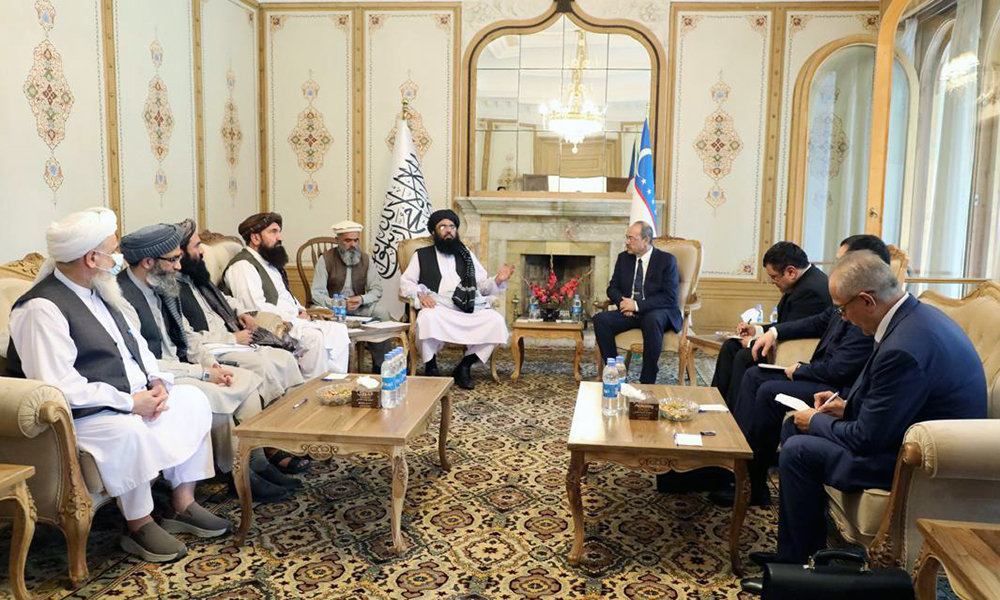Latest News
Kabir meets for talks with visiting Uzbekistan prime minister
The meeting came after Saturday’s signing between the two countries of 35 memorandums of understanding (MoUs) valued at a total of $2.5 billion.

After signing $2.5 billion worth of agreements with Afghanistan on Saturday, the prime minister of Uzbekistan, Abdullah Aripov, met with political deputy prime minister Mawlavi Abdul Kabir for talks on strengthening cooperation in various sectors.
Also in the meeting were Islamic Emirate cabinet members, including ministers of tribal and border affairs; information and culture; and higher education.
Aripov expressed Uzbekistan’s commitment to fostering economic and commercial partnerships with Afghanistan in numerous sectors including mining, electricity and agriculture.
He also affirmed Uzbekistan’s readiness to support Afghanistan through initiatives such as the Trans-Afghan Corridor – a $4.8 billion railway project connecting Pakistan, Afghanistan, and Uzbekistan.
Kabir, in response, acknowledged the importance of strengthening ties between the two nations and reiterated the Islamic Emirate’s commitment to fostering positive relations with Uzbekistan and other regional and global partners, with a focus on prioritizing economic development.
Mawlawi Abdul Kabir underscored the Islamic Emirate’s desire for recognition as the legitimate authority of Afghanistan by countries and international bodies, asserting that only the Islamic Emirate can effectively represent Afghanistan and its people on the international stage.
He expressed optimism regarding Afghanistan’s prospective involvement in the Shanghai Cooperation Organization and underscored the commitment to ensuring that Afghanistan’s territory poses no threat to any nation.
Highlighting Afghanistan’s investment potential in various sectors, including mining, water, energy, transportation, and agriculture, Kabir encouraged investors, particularly those from Uzbekistan, to consider investing in Afghanistan.
In conclusion, the political deputy minister reiterated the Islamic Emirate’s readiness to participate in regional projects like TAPI and CASA-1000, emphasizing that Afghanistan’s stability and progress are essential for regional stability and development.
The meeting came after Saturday’s signing between the two countries of 35 memorandums of understanding (MoUs) valued at a total of $2.5 billion.
The MoUs include 12 investment agreements worth $1.4 billion and 23 trade agreements valued at $1.1 billion.
The deals were signed by Afghanistan’s Deputy Prime Minister for Economic Affairs, Mullah Abdul Ghani Baradar Akhund, and Uzbekistan’s Prime Minister Abdullah Aripov.
The implementation of these wide-ranging agreements is expected to significantly strengthen economic ties between the two neighboring countries and provide a major boost to bilateral trade. The agreements span various sectors including infrastructure, energy, agriculture, and manufacturing.
“This landmark signing is a testament to the strong political will and commitment of the leadership in both Afghanistan and Uzbekistan to deepen economic integration in the region,” said Mullah Abdul Ghani Baradar Akhund.
“We are confident that these agreements will create new avenues for investment, trade, and job creation, benefiting the people of both our nations.”
The signing comes amidst a broader push by the Afghan government to attract foreign investment and expand regional economic cooperation.
Latest News
Continued aid to Afghanistan vital for regional security: Kazakh president

Kazakhstan’s President Kassym-Jomart Tokayev has emphasized the continuation of humanitarian assistance to Afghanistan, stating that the ongoing provision of such aid plays an important role in ensuring regional security.
Speaking at the international conference “Peace and Trust” in Ashgabat, the capital of Turkmenistan, Tokayev described addressing complex humanitarian challenges and the reconstruction of Afghanistan as a necessity.
“To ensure regional security, we consider it essential to continue providing assistance to Afghanistan, including by strengthening international efforts to address complex humanitarian issues and the reconstruction of this country. Kazakhstan remains committed to supporting the people of Afghanistan through humanitarian aid, educational projects, trade development, and food security initiatives,” he said.
Meanwhile, experts believe that sustainable improvement of the humanitarian situation in Afghanistan requires broad cooperation from the international community and support for the country’s economic development.
“Investment can be defined as one of the fundamental drivers of the economic cycle, and whenever Afghan traders do not take their money out of the country and instead invest domestically, it naturally leads to greater growth and dynamism in Afghanistan’s economy,” said Abdul Zahoor Modabber, an economic analyst.
As the humanitarian crisis in Afghanistan continues, reports by international relief organizations indicate that millions of citizens of the country are in urgent need of food, health, and livelihood assistance.
The reduction in funding for aid organizations, the impacts of climate change, and the return of migrants have increased concerns about a further deterioration of the humanitarian situation in the country.
Latest News
Islamic Emirate declines to attend Tehran meeting on Afghanistan
Latest News
Sirajuddin Haqqani: A government that intimidates its people is not a true government

Khalifa Sirajuddin Haqqani, Minister of Interior of the Islamic Emirate of Afghanistan, said during a visit to Khost province on Friday that any government which rules through fear cannot be considered a true government.
“A government is one that is loved by its people, one that serves them with respect and compassion, and from whose behavior people learn ethics and sincerity,” he said.
Haqqani also stressed that Afghans who opposed the Islamic Emirate in the past should be tolerated and treated in a way that helps eliminate hostility and animosity, paving the way for national cohesion.
-

 Sport4 days ago
Sport4 days agoILT20: Desert Vipers edge Gulf Giants in historic super over thriller
-

 Latest News2 days ago
Latest News2 days agoMuttaqi: Afghanistan’s progress requires both religious and modern education
-

 Regional4 days ago
Regional4 days agoSix Pakistani soldiers killed in TTP attack in Kurram District
-

 Business4 days ago
Business4 days agoTrade bodies warn almost 11,000 Afghan transit containers stuck at Karachi port
-

 World4 days ago
World4 days agoPowerful 7.6 earthquake hits northern Japan, tsunami warnings issued
-

 Latest News3 days ago
Latest News3 days agoTrump calls Afghanistan a ‘hellhole’ country as US expands immigration restrictions
-

 Sport5 days ago
Sport5 days agoSorkh Poshan Khafi defeats Sarsabz Yashlar 4-0 in Afghanistan Champions League
-

 Sport3 days ago
Sport3 days agoCommanding wins for Arman FC and Sarsabz Yashlar in Afghanistan Champions League

























